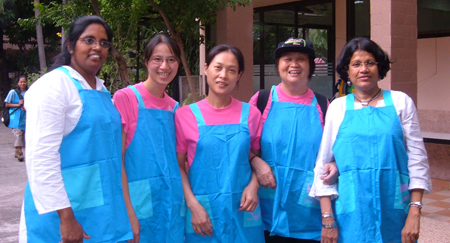by ILO* – Working in private houses as cooks, nannies, cleaners, care workers or just general housekeepers, domestic workers are more isolated than most groups of workers. But from Indonesia to Kenya, Manila to New York City, they are coming together to create their own organizations and, collectively, to demand decent working conditions.
Already twenty-one organizations from across the globe have affiliated to the International Domestic Workers Network (IDWN), and at least another fifty similar organizations will be invited to join and participate when the Network has its formal inaugural conference next October in Uruguay.
“It had always been said that domestic workers were too difficult to organize. They’re proving that this is a myth,” says Claire Hobden of the ILO’s Conditions of Work and Employment branch.
According to a new ILO report, which provides the first detailed research into domestic work worldwide, at least 52 million people are currently working in other people’s houses as domestic workers.
Pay can be very low, employment conditions precarious, and the risk of abuse, including physical and sexual violence, high.
Worldwide Movement
But despite their isolation, they have managed to build links with womens’ organizations, human rights groups, cooperative movements and trade unions, says Elizabeth Tang, international coordinator for the IDWN.
“In Kenya, for example, the trade unions and domestic workers organizations are working very closely. In Indonesia, where there are several trade union centres, all of the trade unions are actively working to support domestic workers,” Tang explains.
For Barbro Budin of the IUF (the global union for food, farm and hotel workers), alliances like these work both ways. A number of representatives of domestic workers’ organizations participated in the IUF Congress held last May in Geneva and inspired other delegates with their strength and conviction, she says.
Fabulous Leaders
“The domestic workers have some fabulous, very strong leaders. They have inspired the whole trade union movement, which has seen how they have managed to organize under such difficult circumstances,” she says.
One successful domestic workers’ organization is Samahan at Ugnayan ng mga Manggagawang Pantahanan sa Pilipinias (SUMAPI), originally established in the Philippines in 1995.
It has played a key role in encouraging the Philippines’ government to be one of the first states to ratify the ILO’s Domestic Workers Convention, 2011 (No. 189), and to follow this with a dedicated Act of Parliament to improve domestic workers employment protection.
Nationwide, SUMAPI has around 8,000 members. One active leader, now 19, described her experience as a child domestic worker where she suffered sexual harassment and was wrongly accused by her employer of theft.
Also In Industrialized Countries
“I was so afraid because my community already judged me. The Barangay [neighbourhood] officials didn’t believe me either. They forced me to admit it. My employer discovered later on it was her daughter who stole the money,” she recalls. With SUMAPI’s help, she is now trying to complete her schooling.
Domestic workers have been organizing successfully too in developed economies.
In the US, for example, the National Domestic Workers Alliance (NDWA) operates in nineteen cities and links over 10,000 nannies, housekeepers and caregivers.
The Alliance has been able to build on the success achieved by Domestic Workers United in New York State, which mobilized to ensure that the state legislature passed a Domestic Worker Bill of Rights in 2010, to give proper employment protection to domestic workers.
Similar initiatives are also under way in other parts of the country, including California.
According to Elizabeth Tang of the IDWN, the ILO’s new domestic workers’ Convention has already had a positive impact.
“The issue has moved on from talk of why domestic workers need their rights protected to how this can be achieved,” she says.
Leading the way in the debate, it is clear, will be the domestic workers’ organizations themselves.
Further information: ILO topic portal on Domestic Workers
*Source: ILO News










